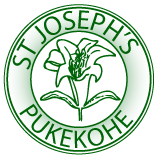
Mathematics & Statistics at St Joseph’s
Mathematics is the exploration and use of patterns and relationships in quantities, space and time. Statistics is the exploration and use of patterns and relationships in data. – Both equip students with effective means for investigating, interpreting, explaining, and making sense in the world in which they live. NZC p26
Our students will be provided with a variety of relevant teaching and learning experiences, taking into account cultural differences and individual needs.
Teaching strategies and techniques will recognise different learning styles, e.g. collaborative learning. Emphasis is on problem solving and inquiry using strategies and thinking skills, including mental development. Mathematical language is an essential part of mathematics programmes and should be incorporated at all levels.
The school-wide programme will be effectively planned and delivered. All strands of the curriculum will be covered as reflected in the New Zealand Curriculum document and student needs. The mathematics programme will provide regular opportunities for…
-
problem solving and mathematical investigations in a collaborative setting using familiar contexts
-
regular practice and consolidation of number knowledge
-
pupils to be challenged
-
use of concrete materials, print and technology used interchangeably and flexibly
-
maths target groups or extension for children with special needs and abilities
-
development of a range of mental strategies to solve problems
-
pupil recording of their thinking
-
use of maths games and learning activities including online home learning programmes such as Maths Seeds and Mathswhizz.
-
a strong knowledge of basic facts without the emphasis on timed tests
Relevant data will be used to find starting points, to monitor progress, and to influence needs-based planning e.g. E-asTTle, PAT and problem solving assessments. Evaluation techniques will include summative, formative, self, peer and teacher assessments. Assessments will provide constructive feedback and feed-forward to teachers, pupils and parents. The school will continue to collect data for school-wide reporting.
Mathematics lessons will be taken daily and will include:
- focused collaborative planning and quality teaching using an inquiry/problem solving approach to provide students with an opportunity for productive struggle in a safe, collaborative environment
-
practise of new learning through supporting activities
-
mental exercises and problem solving
-
teacher/pupil use of concrete materials, text and technology (as appropriate).
-
Assessment for Learning practices of feedback and feed-forward about their next steps, using Maths Progressions developed through the Maths Elaborations


